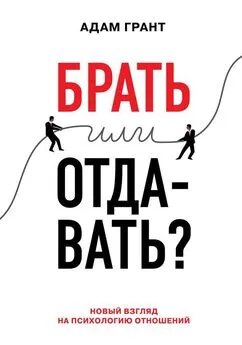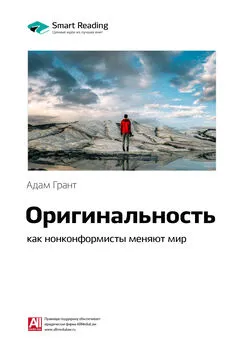Адам Грант - Подумайте еще раз. Сила знания о незнании
- Название:Подумайте еще раз. Сила знания о незнании
- Автор:
- Жанр:
- Издательство:Манн, Иванов и Фербер
- Год:2021
- Город:Москва
- ISBN:9785001698531
- Рейтинг:
- Избранное:Добавить в избранное
-
Отзывы:
-
Ваша оценка:
Адам Грант - Подумайте еще раз. Сила знания о незнании краткое содержание
Для всех, кто хочет научиться критически оценивать реальность и свои решения, переосмысливать и переучиваться, двигаясь вперед.
Подумайте еще раз. Сила знания о незнании - читать онлайн бесплатно ознакомительный отрывок
Интервал:
Закладка:
По поводу влияния футбольных проигрышей на фондовый рынок ведутся активные споры [ John K. Ashton, Robert Simon Hudson, and Bill Gerrard, «Do National Soccer Results Really Impact on the Stock Market?», Applied Economics 43 (2011): 3709–17; Guy Kaplanski and Haim Levy, «Exploitable Predictable Irrationality: The FIFA World Cup Effect on the U.S. Stock Market», Journal of Financial and Quantitative Analysis 45 (2010): 535–53; Jerome Geyer-Klingeberg et al., «Do Stock Markets React to Soccer Games? A Meta-regression Analysis», Applied Economics 50 (2018): 2171–89. ]: хотя эффект доказан многочисленными исследованиями, в некоторых случаях он не подтверждался. Я думаю, дело в популярности футбола в стране: когда на победу команды делают большие ставки, проигрыш не может ничего не значить. Как бы спорт ни влиял на рынки, на настроении людей он безусловно сказывается. В исследовании с участием европейских офицеров выяснилось, что, когда их любимая команда в воскресенье проигрывает [ Panagiotis Gkorezis et al., «Linking Football Team Performance to Fans’ Work Engagement and Job Performance: Test of a Spillover Model», Journal of Occupational and Organizational Psychology 89 (2016): 791–812. ], в понедельник на службе им труднее сосредоточиться, что, вероятно, негативно сказывается на их продуктивности.
239
Gavin J. Kilduff, Hillary Anger Elfenbein, and Barry M. Staw, «The Psychology of Rivalry: A Relationally Dependent Analysis of Competition», Academy of Management Journal 53 (2010): 943–69.
240
Seth Stephens-Davidowitz, «They Hook You When You’re Young», New York Times, April 19, 2014, www.nytimes.com/2014/04/20/opinion/sunday/they-hook-you-when-youre-young.html; J. Clement, «Major League Baseball Teams with the Most Facebook Fans as of June 2020», Statista, June 16, 2020, www.statista.com/statistics/235719/facebook-fans-of-major-league-baseball-teams.
241
George A. Kelly, The Psychology of Personal Constructs, vol. 1, A Theory of Personality (New York: Norton, 1955).
242
Daniel J. Isenberg, «Group Polarization: A Critical Review and Meta-analysis», Journal of Personality and Social Psychology 50 (1986): 1141–51.
243
Robert M. Bray and Audrey M. Noble, «Authoritarianism and Decision in Mock Juries: Evidence of Jury Bias and Group Polarization», Journal of Personality and Social Psychology 36 (1978): 1424–30.
244
Cass R. Sunstein and Reid Hastie, Wiser: Getting Beyond Groupthink to Make Groups Smarter (Boston: Harvard Business Review Press, 2014).
245
Liran Goldman and Michael A. Hogg, «Going to Extremes for One’s Group: The Role of Prototypicality and Group Acceptance», Journal of Applied Social Psychology 46 (2016): 544–53; Michael A. Hogg, John C. Turner, and Barbara Davidson, «Polarized Norms and Social Frames of Reference: A Test of the Self-Categorization Theory of Group Polarization», Basic and Applied Social Psychology 11 (1990): 77–100.
246
Peter Suedfeld, Katya Legkaia, and Jelena Brcic, «Changes in the Hierarchy of Value References Associated with Flying in Space», Journal of Personality 78 (2010): 1411–36.
247
С Луны: «Edgar Mitchell’s Strange Voyage», People, April 8, 1974, people.com/archive/edgar-mitchells-strange-voyage-vol-1-no-6.
248
Находясь на Земле, астронавты: Personal interview with Jeff Ashby, January 12, 2018; «How to Trust People You Don’t Like», WorkLife with Adam Grant, March 28, 2018.
249
Johannes Berendt and Sebastian Uhrich, «Rivalry and Fan Aggression: Why Acknowledging Conflict Reduces Tension between Rival Fans and Downplaying Makes Things Worse», European Sport Management Quarterly 18 (2018): 517–40.
250
Mark Levine et al., «Identity and Emergency Intervention: How Social Group Membership and Inclusiveness of Group Boundaries Shape Helping Behavior», Personality and Social Psychology Bulletin 31 (2005): 443–53.
251
Herbert C. Kelman, «Group Processes in the Resolution of International Conflicts: Experiences from the Israeli-Palestinian Case», American Psychologist 52 (1997): 212–20.
252
Alison R. Fragale, Karren Knowlton, and Adam M. Grant, «Feeling for Your Foes: Empathy Can Reverse the In-Group Helping Preference» (working paper, 2020).
253
Myron Rothbart and Oliver P. John, «Social Categorization and Behavioral Episodes: A Cognitive Analysis of the Effects of Intergroup Contact», Journal of Social Issues 41 (1985): 81–104.
254
ESPN College Football, www.espn.com/video/clip/_/id/18106107.
255
Seinfeld, season 6, episode 12, «The Label Maker», January 19, 1995, NBC.
256
Tim Kundro and Adam M. Grant, «Bad Blood on the Diamond: Highlighting the Arbitrariness of Acrimony Can Reduce Animosity toward Rivals» (working paper, 2020).
257
Kai Epstude and Neal J. Roese, «The Functional Theory of Counterfactual Thinking», Personality and Social Psychology Review 12 (2008): 168–92.
258
Lee Jussim et al., «The Unbearable Accuracy of Stereotypes», in Handbook of Prejudice, Stereotyping, and Discrimination, ed. Todd D. Nelson (New York: Psychology Press, 2009).
259
Lee Jussim, Jarret T. Crawford, and Rachel S. Rubinstein, «Stereotype (In)accuracy in Perceptions of Groups and Individuals», Current Directions in Psychological Science 24 (2015): 490–97.
260
Jackson G. Lu et al., «Disentangling Stereotypes from Social Reality: Astrological Stereotypes and Discrimination in China», Journal of Personality and Social Psychology (2020), psycnet.apa.org/record/2020-19028-001.
261
Психологи действительно недавно провели исследование и обнаружили, что случайно выбранные названия знаков зодиака могут порождать стереотипы и стать причиной дискриминации. Дева (virgo) на китайском звучит как «девственница» (virgin), что ассоциируется со старой девой — сварливой, брезгливой, дотошной и чересчур привередливой.
262
Gregory R. Maio and James M. Olson, «Values as Truisms: Evidence and Implications», Journal of Personality and Social Psychology 74 (1998): 294–311.
263
Paul H. P. Hanel, Gregory R. Maio, and Antony S. R. Manstead, «A New Way to Look at the Data: Similarities between Groups of People Are Large and Important», Journal of Personality and Social Psychology 116 (2019): 541–62.
264
Thomas F. Pettigrew and Linda R. Tropp, «A Meta-analytic Test of Intergroup Contact Theory», Journal of Personality and Social Psychology 90 (2006): 751–83.
265
Jennifer R. Overbeck and Vitaliya Droutman, «One for All: Social Power Increases Self-Anchoring of Traits, Attitudes, and Emotions», Psychological Science 24 (2013): 1466–76.
266
Leigh Plunkett Tost, Francesca Gino, and Richard P. Larrick, «When Power Makes Others Speechless», Academy of Management Journal 56 (2013): 1465–86.
267
See Eric Boodman, «The Vaccine Whisperers: Counselors Gently Engage New Parents Before Their Doubts Harden into Certainty», STAT, August 5, 2019, https://www.statnews.com/2019/08/05/the-vaccine-whisperers-counselors-gently-engage-new-parents-before-their-doubts-harden-into-certainty/.
268
Nick Paumgarten, «The Message of Measles», New Yorker, August 26, 2019, www.newyorker.com/magazine/2019/09/02/the-message-of-measles; Leslie Roberts, «Why Measles Deaths Are Surging — and Coronavirus Could Make It Worse», Nature, April 7, 2020, https://www.nature.com/articles/d41586-020-01011-6.
269
Helen Branswell, «New York County, Declaring Emergency over Measles, Seeks to Ban Unvaccinated from Public Places», STAT, March 26, 2019, https://www.statnews.com/2019/03/26/rockland-county-ny-declares-emergency-over-measles/; Tyler Pager, «‘Monkey, Rat and Pig DNA’: How Misinformation Is Driving the Measles Outbreak among Ultra-Orthodox Jews», New York Times, April 9, 2019, www.nytimes.com/2019/04/09/nyregion/jews-measles-vaccination.html.
270
Matthew J. Hornsey, Emily A. Harris, and Kelly S. Fielding, «The Psychological Roots of Anti-Vaccination Attitudes: A 24-Nation Investigation», Health Psychology 37 (2018): 307–15.
271
Cornelia Betsch and Katharina Sachse, «Debunking Vaccination Myths: Strong Risk Negations Can Increase Perceived Vaccination Risks», Health Psychology 32 (2013): 146–55.
272
Brendan Nyhan et al., «Effective Messages in Vaccine Promotion: A Randomized Trial», Pediatrics 133 (2014): e835–42.
273
Zakary L. Tormala and Richard E. Petty, «What Doesn’t Kill Me Makes Me Stronger: The Effects of Resisting Persuasion on Attitude Certainty», Journal of Personality and Social Psychology 83 (2002): 1298–313.
274
William J. McGuire, «Inducing Resistance to Persuasion: Some Contemporary Approaches», Advances in Experimental Social Psychology 1 (1964): 191–229.
275
John A. Banas and Stephen A. Rains, «A Meta-analysis of Research on Inoculation Theory», Communication Monographs 77 (2010): 281–311.
276
Personal communications with Bill Miller, September 3 and 6, 2019.
277
William R. Miller and Stephen Rollnick, Motivational Interviewing: Helping People Change, 3rd ed. (New York: Guilford, 2012).
278
Personal interview with Arnaud Gagneur, October 8, 2019.
279
Arnaud Gagneur et al., «A Postpartum Vaccination Promotion Intervention Using Motivational Interviewing Techniques Improves Short-Term Vaccine Coverage: PromoVac Study», BMC Public Health 18 (2018): 811.
280
Thomas Lemaître et al., «Impact of a Vaccination Promotion Intervention Using Motivational Interview Techniques on Long-Term Vaccine Coverage: The PromoVac Strategy», Human Vaccines & Immunotherapeutics 15 (2019): 732–39.
281
Carolyn J. Heckman, Brian L. Egleston, and Makary T. Hofmann, «Efficacy of Motivational Interviewing for Smoking Cessation: A Systematic Review and Meta-analysis», Tobacco Control 19 (2010): 410–16.
Читать дальшеИнтервал:
Закладка:










